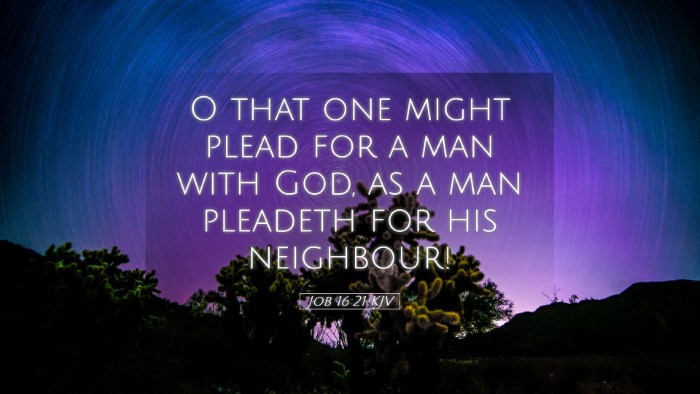Old Testament
Genesis Exodus Leviticus Numbers Deuteronomy Joshua Judges Ruth 1 Samuel 2 Samuel 1 Kings 2 Kings 1 Chronicles 2 Chronicles Ezra Nehemiah Esther Job Psalms Proverbs Ecclesiastes Song of Solomon Isaiah Jeremiah Lamentations Ezekiel Daniel Hosea Joel Amos Obadiah Jonah Micah Nahum Habakkuk Zephaniah Haggai Zechariah MalachiJob 16:21
Job 16:21 KJV
O that one might plead for a man with God, as a man pleadeth for his neighbour!
Job 16:21 Bible Commentary
Commentary on Job 16:21
Verse (Job 16:21): “Oh that a man might plead with God, as a man pleadeth for his neighbour!”
Introduction
Job 16:21 captures a pivotal moment in the Book of Job, where Job expresses the intense desire for a mediator between himself and God. This plea illustrates not only Job's anguish but also his yearning for vindication in the face of suffering. The insights drawn from esteemed commentaries shed light on the profound theological implications of this verse.
Contextual Background
The Book of Job presents the story of a righteous man enduring unimaginable suffering. The narrative involves deep discussions between Job and his friends, who misinterpret Job's plight as punishment for sin. Job remains steadfast in his integrity and seeks to understand his suffering while longing for divine justice.
Matthew Henry's Insights
Matthew Henry comments extensively on the human desire for understanding and pleading before God. He emphasizes that Job, in his intense suffering, wishes to argue his case before God, much like a lawyer would represent a client. This desire reflects a common human experience of feeling distant from divine justice:
- Pleading for Clarity: Job’s request illustrates a longing for clarity regarding his suffering.
- The Role of a Mediator: Henry suggests that this longing points to the necessity of a mediator, ultimately foreshadowing Christ's role as advocate and intercessor.
- Communicating with God: The verse encapsulates the essence of prayer, where believers seek to articulate their pain and seek understanding from God.
Albert Barnes’ Perspective
Albert Barnes elaborates on the human condition reflected in Job's exclamation. He notes that Job's desire to contend with God reveals the deep existential struggles faced by humanity:
- Understanding Divine Justice: Barnes emphasizes that Job's plea is rooted in a desire to comprehend the justice of God, particularly in times of suffering.
- Intercession and Advocacy: Barnes highlights the significance of having someone who can intercede on behalf of sinners, a foreshadowing of Christ's advocacy in the New Testament.
- Personal Connection: The notion of pleading “as a man pleadeth for his neighbor” illustrates the need for relationship and connection in communication with the divine.
Adam Clarke's Commentary
Adam Clarke provides a detailed analysis of the verse, emphasizing the emotional weight of Job's words. Clarke suggests that Job's profound despair leads him to cry out for an advocate:
- Despair and Hope: Clarke notes that while Job is engulfed by despair, his call for an advocate reflects a seed of hope, indicating that he believes in the possibility of a just resolution.
- The Nature of Mediation: Clarke links Job's wish for a mediator to the broader biblical theme of redemption, suggesting that the desire for representation before God is present throughout scripture.
- Human Advocacy: He also points out the importance of human intercessors—friends, family, and community—in times of suffering, paralleling God’s everlasting role as the ultimate advocate.
Theological Implications
This verse opens a rich dialogue about the nature of suffering and the complex relationship between humanity and God. Theological reflections include:
- The Need for Mediation: The verse highlights a key theological construct—the necessity of a mediator in approaching divine justice. This prefigures the New Testament revelation of Christ as the great High Priest.
- Understanding Suffering: Job's lament helps frame suffering not just as punishment, but as a mysterious aspect of the human condition that calls for deeper understanding and dialogue with God.
- Advocacy in Community: The communal aspect of this verse underscores the importance of bearing one another's burdens, as Job seeks someone to plead on his behalf.
Application for Today
Job 16:21 serves as a poignant reminder for contemporary believers in their prayer life and understanding of suffering:
- Encouragement in Suffering: Believers are encouraged to express their needs and desires to God, much like Job, fostering a personal and authentic prayer life.
- Role of Community: The verse serves as a call to action for the church to be a place of advocacy and support for those in distress.
- Reassurance of Divine Justice: Ultimately, the plea for justice resonates with the promise that God hears our cries and will ultimately bring justice, whether in this life or the next.


